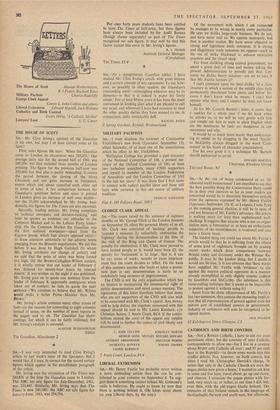SIR,—Mr. Henry Fairlie has probably never written a more misleading
article than the one he con- tributed to your columns on September 6. To sug- gest there is something sinister behind Mr. Grimond's smile is ludicrous. He ought to know by now that there is nothing behind it. (He keeps quiet about his own Liberal days, by the way.) Of the movement with which I am connected he manages to be wrong in nearly every particular. He says we dislike large-scale business. We do not, and have never 'said so. We oppo'se monopoly, but that is another matter. We have never objected to strong and legitimate trade unionism. It is strong and illegitimate trade unionism we oppose—such as the use of strike blackmail to enforce restrictive practices and the closed shop.
Far from disliking strong central government, we spend a great deal of time and money asking the present Administration to provide just that. Cer- tainly we dislike heavy taxation—are we to take it that Mr. Fairlie favours it?
I can't comment upon his final dislike 'of a class structure in which a section of the middle class feels permanently threatened from above and below' be- cause I don't know what he means. I can't find anyone who does, and I suspect he does not know himself.
As for Mr. Correlli Barnett's letter, it seems that it rankles for a whole year if we hit back when he attacks us, so we will be very gentle with him and simply ask him to state in plain English what are the tendencies he feels are dangerous in our movement and why.
It would be so much more manly than endeavour- ing to smear us by dragging in the word 'fascist,' as McCarthy always dragged in the word 'Com- munist' in his bouts of character assassination.
For his own good it is a technique Mr. Barnett should endeavour to avoid.
*


































 Previous page
Previous page